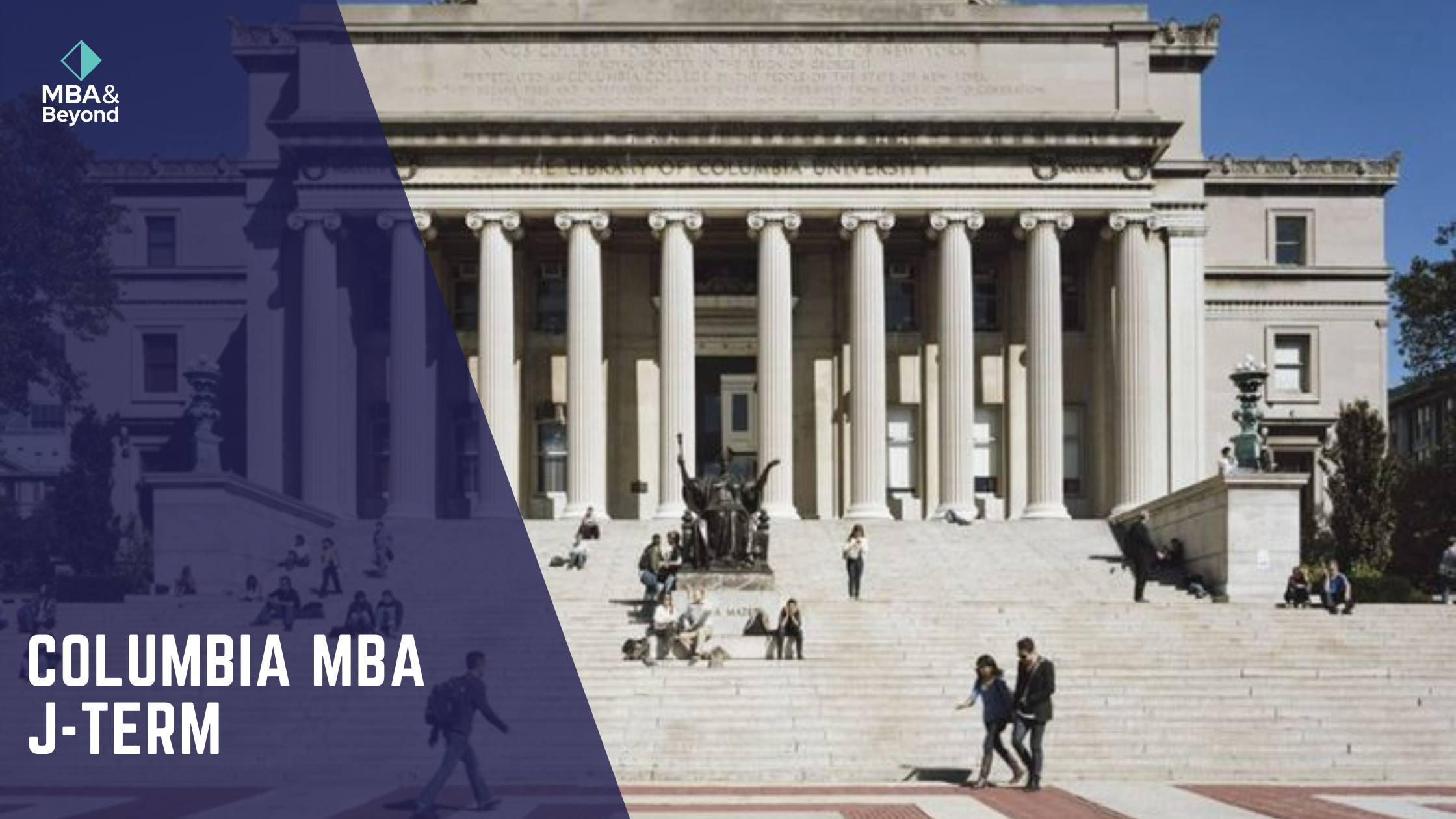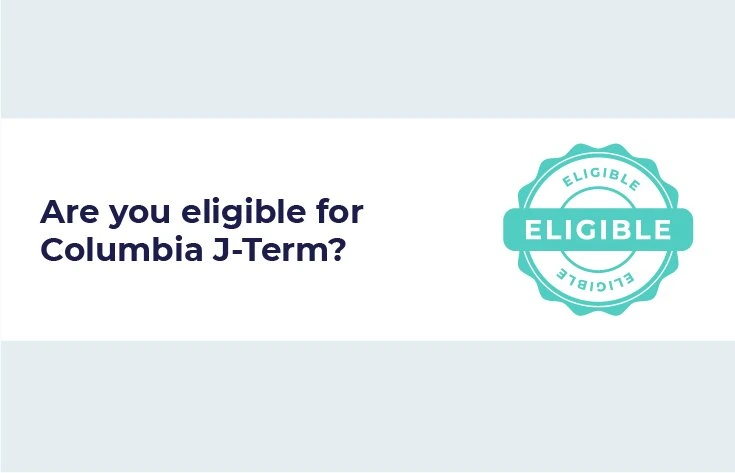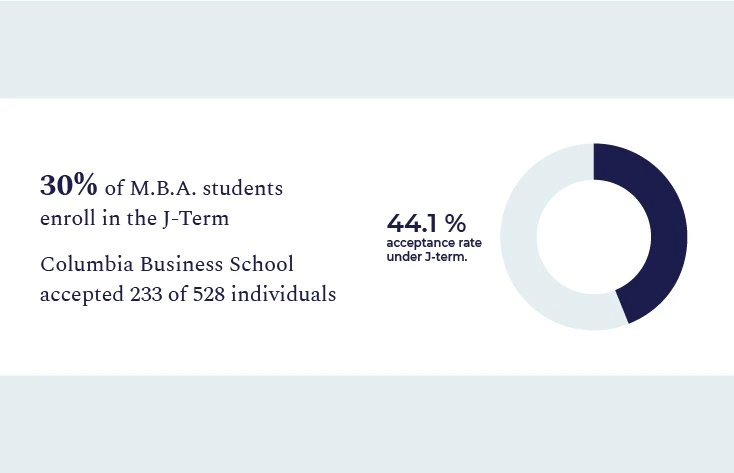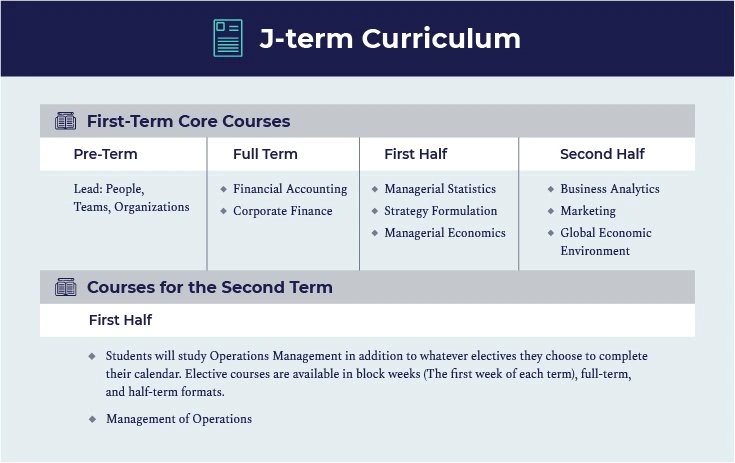Columbia MBA J-term Program: All You Need to Know

When it comes to an MBA program, who doesn’t want to start late and finish on time? Columbia Business School recognizes that the traditional two-year MBA schedule may not be right for every student, so they introduced their J-term and shortened the time frame from 24 months to 16 months. However, shortening the time does not mean compromising education quality, as they maintain the same professors, rigorous core curriculum, and highly selective admissions standards.
This page provides all of the information that a candidate needs to know about the CBS j-term. We recognize that information on J-term is limited; therefore, we attempted to gather data ranging from – What is a J-term to how to build your J-term application.
Here is the Snapshot of the article:
Columbia Business School is located in New York City, the global business capital provides its varied and enterprising students with daily access to key industry leaders. The Columbia Business School provides
- An Unrivalled Academic Excellence Culture
- Exposure to the Business Pulse, both within and outside the classroom
- Diverse, open, and entrepreneurial
- Making a Significant Contribution to Business and Society
Columbia J-term provides a few entries; the most well-known is their J-term, the most well-known entry of C.B.S. Although the course is only 10 months long, C.B.S. does not compromise on the quality of education or the availability of resources to its students.
What is a J-term MBAThe typical two-year MBA program at Columbia Business School understands that it may not be the best fit for every student. Their January-entry option allows qualifying students to skip the summer internship and complete their degree in only 16 months, lowering the opportunity cost of being out of work while studying.
| Category | J-Term (January Entry) | August Term (August Entry) |
|---|---|---|
| Class Size | 233 students, divided into 3 clusters | 629 students, divided into 3 clusters |
| Application Deadlines | Round 1: June 18, 2024 Round 2: September 5, 2024 | Round 1: September 10, 2024 Round 2: January 7, 2025 Round 3: April 1, 2025 |
| Internship | No summer internship offered | Includes summer internships between the second and third terms |
| Program Length | 16 months (Accelerated) | 20 months (Traditional) |
| Target Audience | Students not requiring internships, including sponsored students, entrepreneurs, or those staying in the same industry | Students looking for a full MBA experience, including career changers |
| Program Start Date | January 2025 | August 2025 |
Aside from that, both entries are similar to one other.
In every regard save the scheduling, the January term is identical to the August term: same instructors, same demanding core curriculum, same very selective admissions requirements. Orientation is held in the spring for J-Term students, whereas it is held in the summer for August-entry students. Begin their second terms. J-Term students complete their core courses over the summer, while
The two tracks merge in the autumn of the second year, and all MBA students select electives from the same pool, have access to the same career management tools, run the same clubs, and graduate as a single class. In January, around 30% of full-time MBA students enrolled.
Columbia MBA J-Term CalendarJ-Term Requirements.

For the January term, the most important criteria is that you do not believe you require an internship. Students who want to stay in the same industry (including sponsored students), entrepreneurs, and students in family enterprises are drawn to this.
There is no early decision option for January admission. Due to the timing of the application season, January term candidates are ineligible for merit fellowship consideration. Once the application is ready in June, they begin considering applicants for January entrance. Early September is the last application deadline.
Columbia Business School has a rolling admissions procedure, which means that applications are assessed and judgments are made as they come in. It is usually preferable for you to submit your application as soon as possible.
J-Term Deadlines
The school has not yet issued the dates, but if we look at prior deadlines, we can see that the application normally begins in August, and the deadline is in the first week of October, so be prepared to apply early in August.
Check their website frequently to confirm the dates and deadlines for J-term entrance: https://academics.gsb.columbia.edu/
J-Term Acceptance Rate

It is widely known that the admission percentage for the January term is substantially higher; however, this is large because they are low-risk applicants to the school. Given that your firm is financing you and you do not require an internship, applying for J-Term makes much sense the J-Term was designed for someone with your profile (frequently, individuals who need an internship or don’t have set objectives apply to J-Term because it has a higher acceptance rate, despite having the incorrect profile for the program).
Out of all the MBA applications, around 30% of M.B.A. students enroll in the J-Term, and according to C.B.S., they have accepted 233 of the 528 individuals submitted for a 44.1 percent acceptance percentage under that January option.
J-Term Curriculum

Columbia MBA J-TERM Scholarships

Mid-October requires January-entry scholarship applications and supporting documents, or two weeks after admission, whichever comes first. Notifications of decisions begin in November and continue on a rolling basis.
Award amounts varies from $7,500 to $30,000 for individuals who qualify and depend on available money (amounts can sometimes be higher in certain circumstances). Approximately half of those who apply are awarded a need-based scholarship, with the average grant amounting to over $20,000. Despite the high number of awardees, students should not assume they will get a need-based scholarship because these awards are not guaranteed. In most cases, awards are renewed for the second year of study.
How to Build Your Profile for Columbia J-Term
Enrolling in top-tier MBA programs worldwide necessitates being extraordinary; that is, someone who can deliver academic work at an entirely new level. Furthermore, getting into a top business program is extremely difficult, with elite institutions admitting just a small percentage of candidates from the outstanding performer’s pool. As a result, an MBA from a top-tier institution remains a dream for many ambitious applicants each year. As a result, be certain that you fully comprehend each stage of the admissions process.
That is why we have compiled a thorough guide on building a killer application; to learn more, visit the link below.
How to build your MBA Application 101
Columbia MBA J-term is a blessing for those who do not want to attend a full-time program, so with that many applicants are applying for this term, which makes it even more competitive, and to get into CBS’s program, one must create an outstanding application, and before applying, you must know where you stand as an applicant and what gaps are missing in your profile.

Our experts assist you in identifying that gap, filling it with something solid, and connecting the dots to your goals, so schedule a call with us and get a free profile evaluation.
Frequently Asked Questions
1.
What is Columbia J-term?
Columbia Business School’s normal two-year M.B.A. program recognizes that it may not be the ideal option for every student. Their January-entry option allows qualified students to bypass the summer internship and finish their degree in only 16 months, reducing the opportunity cost of being out of work while studying.
2.
Is Columbia J-Term easier to get into?
The acceptance rate is higher, but it does not indicate that the competition is less; the competition is the same as for a regular M.B.A., so it’s not simple to get in, but it does have a higher acceptance rate.
3.
Does Columbia have a 1 year MBA?
They do not offer a one-year program; instead, their Columbia MBA J-term lasts 16 months, and their full-time MBA program lasts two academic years.




Leave a Reply